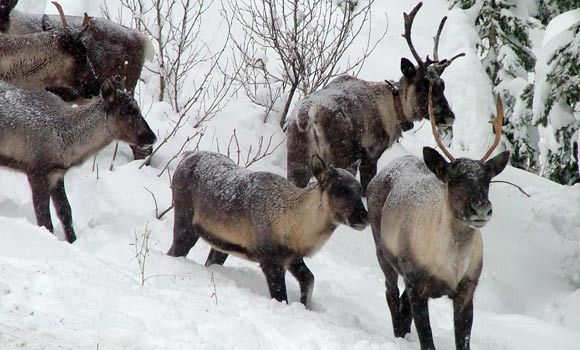Canada to kill thousands of wolves to reverse caribou decline caused by tar-sands development
By Dean Kuipers
9 February 2012 Woodland caribou herds in Canada are declining, and tar sands development is a big part of the reason why. But Canada’s national and provincial governments know what do about that: Kill the wolves. That’s the crux of new posts by both Grist and the National Wildlife Federation, which are following this issue. Both are revisiting the environmental costs of tar sands development in Alberta. The federation cites numerous studies released in 2011 that found that oil and gas development in Canada is contributing to the decline of woodland caribou herds. Both the national government and the province of Alberta acknowledge that tar sands development adversely affects the herds. Environment Canada, the country’s national environmental agency, announced in fall 2011 that a draft of a nationwide caribou recovery plan – which is not yet in effect – would include plans to cull the wolf population near the three herds that are directly affected by the tar sands development. Environment minister Peter Kent was quoted in numerous stories acknowledging that “thousands” of wolves might need to be killed. Many stories have focused on the use of strychnine poisoning and aerial hunting to kill the wolves. Officials in Alberta, however, want to emphasize that this program has not yet begun and, while wolves are currently controlled in the province, that images of a wholesale wolf slaughter are overblown. […] Alberta has a reported 18 herds or populations of woodland caribou in the province. These are not the vast, migrating caribou herds seen in Alaska, but small groups more easily affected by habitat loss. Mark Johnson, a spokesman for Environment Canada, acknowledged the plight of the caribou, writing in an emailed response: “Our evidence indicates that Alberta’s boreal woodland caribou herds are at a high risk of extirpation.” Meaning, to die out locally. He added, “There is a strong correlation between self-sustainability of caribou herds and the amount of habitat disturbance (both man-made and natural disturbance) on the landscape.” A four-year study led by Samuel Wasser, director of the Center for Conservation Biology at the University of Washington, found in 2011 that the caribou in the area were more threatened by habitat loss because of oil and gas development than they were by wolves. This leaves the province and the Canadian government with hard choices. […]
